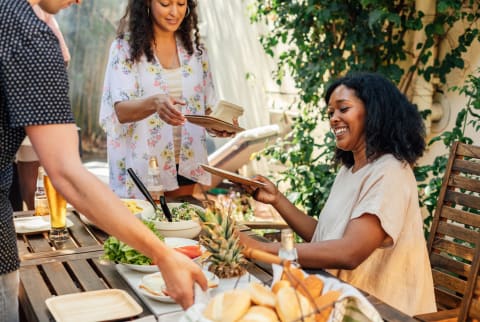Advertisement
The Psychology Behind Being The "Mom" In The Friend Group


Every friend group has at least one "mom friend." No, we're not talking about a literal mother, but the figurative name we give our friends who take on the motherly, nurturing role in relationships. But why do they do it, and how can these folks thrive?
We asked Marci Moberg, M.S., an intuitive healer, reiki master, and expert on empaths.
Why some people naturally become the "mom friend"
There's a handful of reasons someone might be inclined to take on a motherly role in their friendships. According to Moberg, this can include personality tendencies, childhood experiences with caretakers, and how they seek validation, purpose, and worth in life.
Let's say, for example, someone grew up in a home where they were given a lot of responsibilities or were even expected to emotionally support a parent. This could translate to nurturing as a way to show love.
But "mom friend" tendencies can also be simply personality-based: Perhaps they're more mature or serious (ever heard someone be called an old soul?), and that's why they may end up watching out for friends on a night out rather than letting loose.
What's important to remember is that every friendship requires balance, so Moberg notes it's important to be mindful of codependent friendship behaviors such as people-pleasing, always trying to fix or solve problems, or believing being motherly is the only way you can keep a friend. If you feel like "your friend always needs help and you have a responsibility to be the helper," she adds, you might want to think about where these tendencies are arising from.
How to thrive as the mom friend
Ask yourself these questions:
- How do I feel when I embody a mother archetype in my friendships?
- Why do I feel pulled to embody a nurturing role? In other words, what's my motivation?
- Do I feel obligated or inspired to take on this role?
- After I show support, do I feel energized or depleted?
- Do I equally allow myself to receive care in my friendships as much as I care for others?
Moberg recommends these questions to help you get clear on the motivations behind your behavior, as well as recognize whether you're receiving the support you need.
Open up to receive support
"Notice if you struggle to receive support from your friends," Moberg says. If you do, she recommends making a point to reach out for help when you need it. "The next time you're having a hard time, tell your friends and ask for what you need. This fosters healthy mutual friendship rather than one-sided friendship."
Prioritize your self-care
And, of course, always prioritize your own self-care. "Your ability to care for others depends on filling your own cup," Moberg says. "Being a good friend relies on us being a good friend to ourselves—you deserve the kind of nurturing you give to others too."
The takeaway
The bottom line is, there's absolutely nothing wrong with being the mom friend—as long as it isn't draining you. If it "fills your cup," so to speak, and you can also receive support, "you have created a balanced friendship where each person steps up to nurture the other person," Moberg says.
But if you feel a need to take on a motherly role out of obligation or because that's the role you've always played, Moberg adds, "it's time for deep reflection."